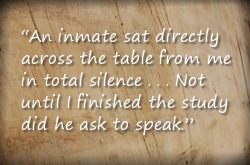Should We Stop Asking Jesus Into Our Hearts?
Body
“I am also saying to those who, like me, have asked Jesus into their hearts thousands of times, that they can ‘stop asking Jesus into their heart’ and start resting in the finished work of Christ. Salvation is not given because you prayed a prayer correctly, but because you have leaned the hopes of your soul on the finished work of Christ.”
Discussion
That famous quote from St. Francis? He never said it
Body
“ ‘Preach the Gospel at all times. When necessary, use words.’ … But here’s the fact: Our good Francis, who lived in the 13th century, never said such a thing.”
Discussion
The Jail Stalker

My pastoral colleague, Paul, and I have ministered for a number of years to inmates at the Shakopee Jail. The weekly Bible studies we lead there did not originate from a strategic vision developed in the sterile confines of a board room. They sprang from the messy reality that a new attendee of our church had taken up residence at the jail for a season. Although we did not know him well, he had sent word that he would appreciate a visit. The look on his haggard face and the tears of appreciation that welled up in his tough-guy eyes were all it took for me to keep going back long after he was released and living in another state.
Jesus’ prophecy concerning God’s final commendation of those who ministered in life to vulnerable people took on new meaning: “I was in prison and you visited to me” (Matt. 25:36). In Jesus’ vignette those receiving this divine accreditation are incredulous: “When did we see you sick or in prison?” they ask God (Matt. 25:39). “And the King will answer them, ‘Truly I say to you, as you did it to one of the least of these my brothers, you did it to me’ ” (Matt. 25:40). God takes special interest in prisoners.
Yet our ministry to these marginalized members of society is far from a one-way extension of mercy. As is standard in Christ’s kingdom, those who give much receive more. Any aid we render to inmates is paid back many times over in lessons learned and skin-tingling evidences that God stalks the darkest recesses of our world.
Discussion
Approaching the King: A Parable

Once upon a time there reigned a powerful, brave, and noble king. As an intrepid warrior he had freed the subjects of his realm from the tyrannical rule of an invading monarch. Reigning now with integrity and compassion, the good king secured peace for his subjects and with tireless self-sacrifice provided everything necessary for their prosperity. The domain flourished under his faithful rule. Needless to say, his subjects highly esteemed their king.
One day several village children naively decided to journey to the king’s palace in order to pay him a visit. With childish enthusiasm they began to plan their grand expedition. When the discussion turned to how they should present themselves to their liege, they realized they knew nothing of the protocol for approaching a king at court. Everyone had a different idea, and they began to argue among themselves as to whose approach was the right one.
An older girl from the village happened upon the chaotic scene. She scolded each of the children for claiming his or her opinion was the truth. They needed to respect one another’s viewpoint, she explained. “Each of you is free to form your own opinions on how to approach the king, but you simply cannot insist that everyone else must accept your approach as the only way. If you approach the king with respect and sincerity,” she assured the children, “he will gladly welcome each of you on your terms.”
Heeding the girl’s sage advice, the children embarked on their journey. They were all content to hold their subjective opinions and were pleased to extend to each of the other children in the group the freedom to devise his or her unique approach to the king. Ironically, the children never thought to investigate what the king himself thought about the matter.
Discussion
"He said, 'I am the way, I am the truth, and I am the life.' I'm betting my life that Jesus wasn't a liar."
Body
TAPPER: …Brian Norris tweets that we should ask you if you believe faith in Jesus Christ is the only way to heaven. R. WARREN: I do believe that. And I believe that because Jesus said it. See, I don’t set myself as an authority. Jesus said I am the way. He didn’t say I’m one of the ways, he said I’m the way. I’m the truth. And I’m the way. I’m betting my life that Jesus wasn’t a liar.
Discussion
“...this aspiration is not a sign that the believer ... is a ‘legalist’”
Body
Those who have been saved by grace alone through faith alone in Christ alone properly and by virture of regeneration and their new nature aspire to increase in holiness, in faithfulness to Christian duty and in obedience to God’s law.
Discussion
Report from The Elephant Room Round 2

The second annual Elephant Room event is over and the blogosphere is already lit with responses. I had the opportunity to attend a simulcast of the event in Lansing, MI at Riverview Church, one of Mark Driscoll’s Acts29 church plants. During the event, I tweeted around 100 quotes from the participants using the SharperIron Twitter account and took 4 pages of personal notes.
What follows will not be a summary of each of the seven conversations. That would be an exercise in vain repetition since Trevin Wax masterfully transcribed (and very accurately, might I add) on his blog what each person said, pretty much word for word. You can read it at Kingdom People.
What I do want to do is offer some personal reflections and observations about the event as someone who was able to not merely read what was said but see it said. As is the trouble with properly interpreting emails, so it is with properly interpreting the words of others in a setting like this when you cannot see the facial expressions and body language that sometimes enhance or say more than the person’s words.
Theology
There is no doubt that the invitation of Bishop T. D. Jakes sparked a huge controversy and was the focal point of the event leading up to Wednesday. Immediately before The Elephant Room 2 blog announced that Jakes was being invited, it announced that Mark Dever was going to join the event. Then, immediately after the Jakes announcement, the Dever announcement was removed. To my knowledge, no explanation was ever published, from either MacDonald or Dever, as to why Dever withdrew his presence from ER2, but it does not take a seminary class in theology to figure it out.

Discussion